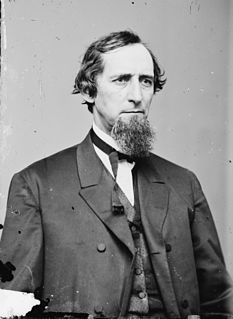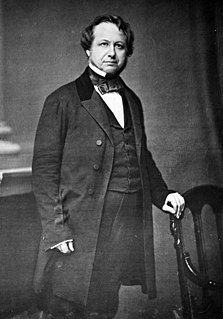The United States Senate elections of 1860 and 1861 were elections corresponding with Abraham Lincoln's election to the presidency. The nascent Republican Party increased their Senate seats in the general elections, and after southern Democrats withdrew to join the Confederacy, Republicans gained control of the United States Senate. To establish a quorum with fewer members, a lower total seat number was taken into account.

The 1820-1821 United States Senate election in Pennsylvania was held on three separate dates from December 1820 to December 1821. On December 10, 1821, William Findlay was elected by the Pennsylvania General Assembly to the United States Senate.

The 1840 United States Senate election in Pennsylvania was held on January 14, 1840, after the regularly scheduled election in December 1838 was postponed due to the Buckshot War. Daniel Sturgeon was elected by the Pennsylvania General Assembly to the United States Senate.

The 1845 United States Senate election in Pennsylvania was held on January 14, 1845. Incumbent Daniel Sturgeon was re-elected by the Pennsylvania General Assembly to the United States Senate.

The 1857 United States Senate election in Pennsylvania was held on January 13, 1857. Simon Cameron was elected by the Pennsylvania General Assembly to the United States Senate.

The 1861 United States Senate special election in Pennsylvania was held on March 14, 1861. David Wilmot was elected by the Pennsylvania General Assembly to the United States Senate.

The 1911 United States Senate election in Pennsylvania was held on January 17, 1911. Incumbent George T. Oliver was re-elected by the Pennsylvania General Assembly to the United States Senate. This was the last Class I U.S. Senate election to be decided by the Pennsylvania General Assembly before the ratification of the 17th Amendment to the U.S. Constitution, which mandated direct election of U.S. Senators.

The 1812 United States Senate election in Pennsylvania was held on December 8, 1812. Abner Lacock was elected by the Pennsylvania General Assembly to the United States Senate.

The 1818 United States Senate election in Pennsylvania was held on December 8, 1818. Walter Lowrie was elected by the Pennsylvania General Assembly to the United States Senate.

The 1843 United States Senate election in Pennsylvania was held on January 10, 1843. Future President of the United States James Buchanan was re-elected by the Pennsylvania General Assembly to the United States Senate.

The 1849 United States Senate election in Pennsylvania was held on January 10, 1849. James Cooper was elected by the Pennsylvania General Assembly to the United States Senate.

The 1856 United States Senate election in Pennsylvania was held on January 14, 1856. William Bigler was elected by the Pennsylvania General Assembly to the United States Senate.

The 1867 United States Senate election in Pennsylvania was held on January 15, 1867. Simon Cameron was elected by the Pennsylvania General Assembly to the United States Senate.

The 1873 United States Senate election in Pennsylvania was held on January 21, 1873. Simon Cameron was re-elected by the Pennsylvania General Assembly to the United States Senate.

The 1879 United States Senate election in Pennsylvania was held on January 20, 1879. J. Donald Cameron was re-elected by the Pennsylvania General Assembly to the United States Senate.

The 1885 United States Senate election in Pennsylvania was held on January 20, 1885. J. Donald Cameron was re-elected by the Pennsylvania General Assembly to the United States Senate.

The 1891 United States Senate election in Pennsylvania was held on January 20, 1891. J. Donald Cameron was re-elected by the Pennsylvania General Assembly to the United States Senate.

The 1897 United States Senate election in Pennsylvania was held on January 19, 1897. Boies Penrose was elected by the Pennsylvania General Assembly to the United States Senate.

The 1903 United States Senate election in Pennsylvania was held on January 20, 1903. Boies Penrose was re-elected by the Pennsylvania General Assembly to the United States Senate.

The 1909 United States Senate election in Pennsylvania was held on January 19, 1909. Boies Penrose was re-elected by the Pennsylvania General Assembly to the United States Senate. This was the last Class III U.S. Senate election to be decided by the Pennsylvania General Assembly before the ratification of the 17th Amendment to the U.S. Constitution, which mandated direct election of U.S. Senators.






